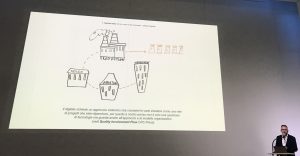
A truth is beginning to emerge about how reality is shifting in organizations. It was voiced clearly in a presentation yesterday by the CEO of a forward-thinking digital solutions provider in Italy, Stefano Righetti of Hyphen-Italia. The truth is this: no company will be able do without Digital Transformation, at least for its core processes. But Digital Transformation is not just about technology, the real problem is changing the organization design to allow Digital Transformation to happen. In other words, if we don’t start re-designing our organizations around processes and projects, in a systemic way, then we can’t fully bring about Digital Transformation with all the advantages it offers.
The outdated paradigm
Most organizations today still work within the paradigm of separation – as though they were made up of separate chunks, bits and pieces, departments, function. This thinking ultimately leads to silos, with all the accompanying frustration and ineffectiveness. It’s a Newtonian paradigm that completely misunderstands the nature of complexity and it no longer fits.
Work, instead, is based on flow of input and output, at varying scales. People realize this and try and find remedies. The problem is, attempts at “integration” still rest on the paradigm of separate pieces, when what is required is seamless interconnection that naturally enables Quality of product and service, Involvement of people and Flow of output. This means creating the right interdependencies that allow people to communicate and carry out their work without artificial barriers.
Unless we change the paradigm beneath the way we build organizations, and indeed entire supply chains, we will keep trying to apply the wrong solutions. It’s like having the wrong OS for what needs to be done in the 21stcentury.
Processes and projects
It’s not something the Big Name consulting firms can help with. They’ve been too busy imposing their outdated functional/hierarchical ideas. At Intelligent Management we start from the very foundation – a systemic understanding of what work is (processes and projects) and how an organization can be designed to allow flow of input to be transformed into flow of output with the greatest speed and minimum variation. We call the organizational design for this the Network of Projects.
The change is fundamental and radical, but it doesn’t have to be a leap in the dark because a path and a method exist. As far back as the 1950s, Dr. W. Edwards Deming had already pioneered the view of the organization as a system. Dr. Eliyahu Goldratt showed the way to maximize the output of any organization through a strategically chosen ‘constraint’. A coherent and structured way to deploy these approaches is aided by the method underpinned by our work at IM and pioneered by Domenico Lepore. Most companies still lag behind these insights and pay the consequences every day.
We can’t just ty and superimpose digital strategies onto an outdated organizational model based on silos. Complexity is something to be embraced, not cut through (as KPMG so wrongly suggests). Digital Transformation is a unique opportunity to re-think the way we work for good.
Intelligent Management, founded by Dr. Domenico Lepore, are trusted advisors to leaders of organizations. We blog about how to shift your thinking towards broader, systemic possibilities for yourself and your organization. Sign up to our blog here. Intelligent Management provides education and training on systemic management, W. Edwards Deming’s management philosophy and the Theory of Constraints (Decalogue methodology) in North America and Europe.
See our new books The Human Constraint – a business novel that has sold in 27 countries so far and ‘Quality, Involvement, Flow: The Systemic Organization’ from CRC Press, New York, by Dr. Domenico Lepore, Dr. .Angela Montgomery and Dr. Giovanni Siepe.





Leave a Reply